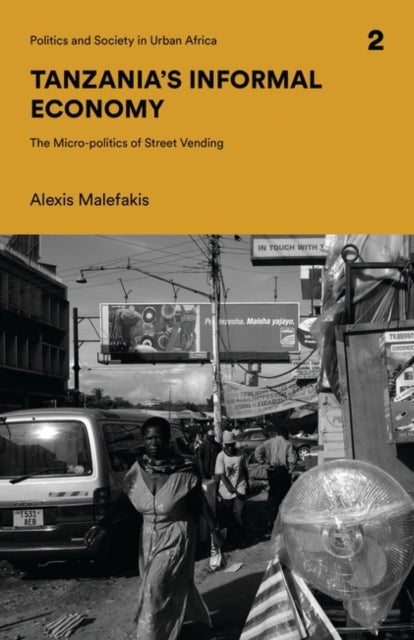AlexisMalefakis
Tanzania's Informal Economy: The Micro-politics of Street Vending
Tanzania's Informal Economy: The Micro-politics of Street Vending
YOU SAVE £14.85
- Condition: Brand new
- UK Delivery times: Usually arrives within 2 - 3 working days
- UK Shipping: Fee starts at £2.39. Subject to product weight & dimension
Bulk ordering. Want 15 or more copies? Get a personalised quote and bigger discounts. Learn more about bulk orders.
Couldn't load pickup availability
- More about Tanzania's Informal Economy: The Micro-politics of Street Vending
The book "The Market Vendors of Dar es Salaam" by Malefakis provides a nuanced portrait of street vendors in Dar es Salaam, shedding light on the internal tensions, rivalries, and conflicting communal ties that shape their experiences and livelihoods. It offers an invaluable new perspective on the functioning of informal economies and the lived experiences of those who depend on them.
\n Format: Paperback / softback
\n Length: 192 pages
\n Publication date: 17 June 2021
\n Publisher: Bloomsbury Publishing PLC
\n
The bustling streets and vibrant marketplaces of Dar es Salaam are alive with a thriving informal economy, where street vendors sell a wide array of secondhand clothing and various other goods. These street vendors often face a precarious existence, constantly under pressure from both local state authorities and international markets. However, their experiences are not solely shaped by these external forces; they are also intricately influenced by a complex interplay of internal tensions, rivalries, and conflicting communal ties. While these internal dynamics are a common feature of informal economies across the globe, they have largely been overlooked and unexamined by academic scholarship.
In his book, "The Informal Economy in Dar es Salaam: Kinship, Ethnicity, and Cooperation," Malefakis delves deep into the lives of these street vendors and offers a nuanced portrait of their struggles and successes. Through extensive ethnographic fieldwork and in-depth interviews with vendors living and working in Dar es Salaam, Malefakis provides a unique perspective on the challenges and opportunities they face in this dynamic economic environment.
One of the key themes that emerge from Malefakis's research is the notion that ties of kinship and ethnicity are often viewed as barriers to success in the informal economy. Despite the importance of these social networks in many African communities, vendors often face discrimination and marginalization due to their perceived affiliations. Malefakis argues that these biases can limit the opportunities available to vendors and hinder their ability to thrive in the market.
However, Malefakis also highlights the ways in which vendors can leverage their kinship and ethnic networks to their advantage. He notes that many vendors have established close relationships with their suppliers, who are often members of their own communities. These relationships can provide access to better quality goods at lower prices, as well as support and solidarity during times of crisis.
Malefakis's book offers valuable insights into the functioning of informal economies, particularly in the context of major African cities. He explores the complex dynamics between vendors, suppliers, and consumers, and sheds light on the strategies that vendors employ to navigate the challenges they face. Through his ethnographic fieldwork and interviews, Malefakis provides a rich and detailed account of the lived experiences of those who depend on the informal economy for their livelihoods.
One of the most striking aspects of Malefakis's work is his recognition of the importance of cooperation in the informal economy. He argues that while competition can be a driving force for innovation and growth, cooperation is also essential for survival and success. Vendors often form informal networks and associations to share resources, information, and support, and to collectively bargain with suppliers and authorities.
Malefakis's book also sheds light on the challenges that vendors face in the face of external pressures, such as government regulations and the influx of imported goods. He notes that many vendors are forced to adapt their business practices to survive, often at the expense of their long-term sustainability. Malefakis calls for greater recognition and support for the informal economy, including policies that promote fair trade, sustainable development, and the protection of vendor rights.
In conclusion, "The Informal Economy in Dar es Salaam: Kinship, Ethnicity, and Cooperation" by Malefakis is a groundbreaking work that offers a nuanced and empathetic portrayal of the lives of street vendors in a major African city. Through his ethnographic fieldwork and in-depth interviews, Malefakis provides valuable insights into the challenges and opportunities faced by these vendors, as well as the complex interplay of internal and external factors that shape their experiences. His book offers a valuable new perspective on the informal economy, and its significance in shaping the economic and social landscapes of African cities.
\n Weight: 242g\n
Dimension: 139 x 217 x 14 (mm)\n
ISBN-13: 9781786994516\n \n
This item can be found in:
UK and International shipping information
UK and International shipping information
UK Delivery and returns information:
- Delivery within 2 - 3 days when ordering in the UK.
- Shipping fee for UK customers from £2.39. Fully tracked shipping service available.
- Returns policy: Return within 30 days of receipt for full refund.
International deliveries:
Shulph Ink now ships to Australia, Belgium, Canada, France, Germany, Ireland, Italy, India, Luxembourg Saudi Arabia, Singapore, Spain, Netherlands, New Zealand, United Arab Emirates, United States of America.
- Delivery times: within 5 - 10 days for international orders.
- Shipping fee: charges vary for overseas orders. Only tracked services are available for most international orders. Some countries have untracked shipping options.
- Customs charges: If ordering to addresses outside the United Kingdom, you may or may not incur additional customs and duties fees during local delivery.


